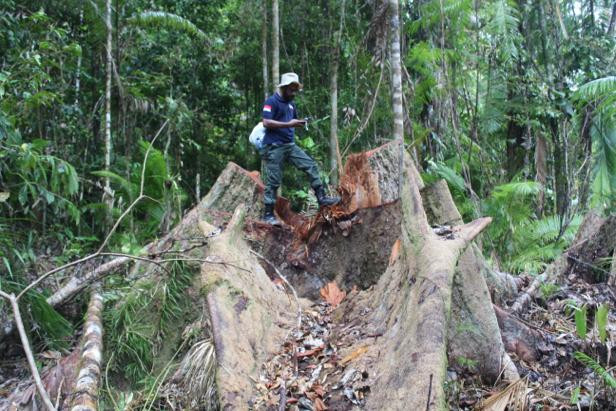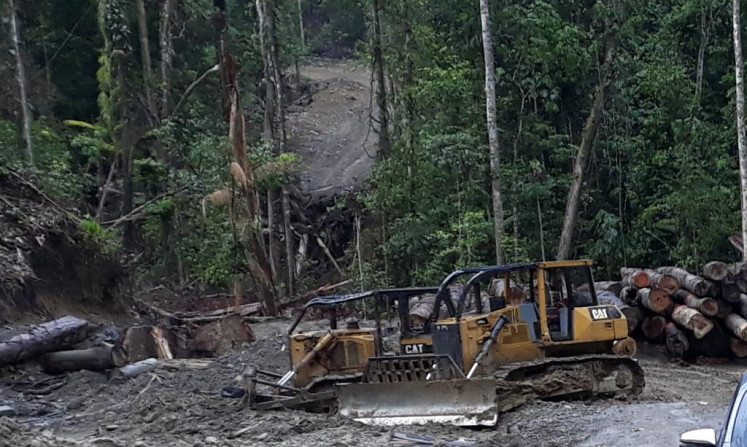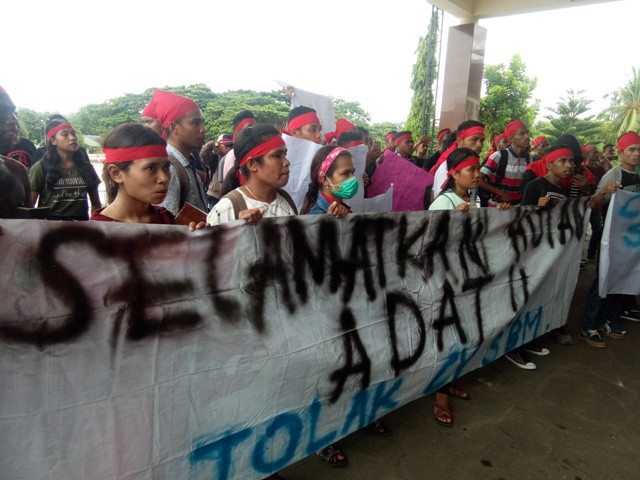
The fight to protect an indigenous forest in Sabuai village, Eastern Seram regency, Maluku is far from over as legal proceedings against a businessperson accused of illegal logging has been halted over reported inaccuracy in the investigation.
Investigators with the Environment and Forestry Ministry’s law enforcement division named a commissioner of logging firm CV Sumber Berkat Makmur (SBM), identified as IQ, a suspect in an illegal logging case in March 2020.
He was named a suspect for allegedly ordering the firm to commit encroachment and illegal logging in the forest where the Sabuai indigenous community resides. IQ was charged under the 2013 law on forest destruction, which carries a maximum punishment of 15 years' imprisonment and a Rp100 billion (US$7.1 million) fine.
CV SBM obtained a plantation permit from the Eastern Seram Forestry Agency in 2018 to establish a nutmeg harvesting industry in Sabuai village, while promising to recruit the villagers and distribute 5,000 nutmeg seeds in the village. But the villagers claimed to have never witnessed the company make good on its promise and instead shifted its focus to logging operations.
Incomplete investigation report
The ministry’s law enforcement division had submitted the documents and evidence on IQ to the Bula Prosecutor’s Office so it could prepare an indictment and register the case with the court. But the prosecutors returned the case to the investigators due to a discrepancy between the submitted evidence and the prosecutors’ investigation.
“Our team only found 50 pieces [of wood] at the crime scene. Meanwhile, the investigators wrote in their report that they seized 100 pieces as evidence in the case,” said Bula Prosecutor’s Office head M.Ilham.
He added that the prosecutor’s office had declared the dossier incomplete and notified the investigators to complete the case.
According to the regulation, the incomplete declaration should be accompanied by a guide on the list of documents or evidence to complete the dossier. The investigators must complete the dossier within 14 days after they receive the dossier back.
However, the ministry’s law enforcement division head for Maluku and Papua region, Adrianus Mossa, claimed that his team had not received the guide to complete them from the prosecutor’s office.
“They didn’t give us a guide on which document we need to submit within 14 days, so we didn’t think there was anything wrong with our dossier,” Adrianus said on Feb. 2.

The sluggish legal proceedings have prompted members of the Sabuai indigenous community to protest in front of the Maluku regional council building and Maluku Prosecutor’s Office on Jan. 26. They demanded that the provincial prosecutor’s office urge prosecutors in Bula to speed up proceedings against IQ.
The villagers also demanded that provincial legislative council members monitor the implementation of the councilors’ recommendation in the Sabuai forest dispute.
In March 2020, the legislative council accused CV SBM of abusing its nutmeg plantation permit to secure the timber exploitation permit and conduct unlawful logging in Sabuai. The councillors urged the company to carry out its operations in line with the nutmeg plantation permit it had been granted.
The company reportedly used its plantation permit to apply for a timber exploitation permit with the Maluku Forestry Agency. The agency later granted the application and issued the permit for CV SBM.
“We issued the logging license because the location, which was the same as that stipulated in the plantation permits, was planted with trees. The license also required the company to carry out reforestation on the cleared land,” Maluku Forestry Agency head Sadli Lie said.
He previously said the area earmarked for CV SBM was not a customary forest, but an “area for other uses [APL].”
During a meeting with the councillors in March 2020, IQ issued a written statement – a copy of which was obtained by The Jakarta Post – admitting that the company had carried out logging activities outside the area earmarked by the permits.
The Maluku Environment Agency later discovered that CV SBM had yet to obtain environmental management and monitoring permits from the Eastern Seram Environment Agency upon committing the logging activities.
“This concludes that what the company did was illegal as it had not obtained all necessary permits,” said Maluku Environment Agency head Roy Syauta.
Villagers accused of destruction
During January’s protest, members of the Sabuai indigenous community also demanded that the police stop an investigation into a case implicating two villagers, 21-year-old Khaleb Yamarua and Stefanus Ahwalam, who were arrested for a vandalism charge against CV SBM.
The indigenous Sabuai people staged a protest to stop the loggers from felling trees on a site they claimed was part of their tribal land in February last year. According to the police’s account, the protest had allegedly turned into a riot, which culminated in what is claimed to be the chaining down of heavy machinery used to extract timber from the forests of Sabuai’s Mount Ahwale.
CV SBM filed a report with the police, accusing the villagers of malicious destruction of property. The police immediately responded to the report by storming the village and rounded up dozens of residents. They eventually named Khaleb and Stefanus suspects on Feb. 24, 2020.
While both suspects were put under house arrest, the suspect naming had the consequence of encroaching on Khaleb’s college education, hindering him from studying as he had to undergo police interrogations.

On Jan. 25, police summoned the two suspects for another questioning session as investigators were completing the case dossier. Later, they would hand over the case to prosecutors who would write an indictment against Khaleb and Stefanus.
The two suspects previously filed a pretrial motion with the Bula District Court to annul their suspect naming. But the sole judge in the pretrial hearing rejected their motion, allowing the investigators to march on with their probes.
Despite the legal proceedings, Khaleb along with other Sabuai villagers said they would never give up fighting for people’s rights over the heritage forest. The villagers had planned to drive away CV SBM from the area ever since the company started logging in their heritage forests in 2019.
Khaleb previously said Sabuai tribe leaders had repeatedly attempted sasi pohon, a ritual of customary law performed to prohibit people from cutting trees in a certain area, with the aim of allowing the ecosystem to replenish.
The villagers also filed their own police report on Aug. 6, 2020, which fell on deaf ears, Khaleb claims.
Clean water supply disruption
Forest Watch Indonesia found that 870 hectares of deforestation had taken place in Eastern Seram regency between 2013 and 2017.
The group also found that the area of remaining tree cover in the regency stood at 833 ha as of 2017. The group also found that there was 1,183 ha of plantation concessions across eastern Seram. Approximately 715 ha was for nutmeg plantation. Nutmeg is a native spice of Maluku.
The deforestation in the Sabuai forest has affected the lives of people living in and around the forest. The tree cover loss in the area triggered landslides and floods that destroyed villagers’ crops and blocked the clean water source.
“We get our clean water from the forest. If the forests are damaged, our access to clean water is blocked,” said Sabuai village secretary Jacob Ahwalam.
Agus Kastanya, an agriculture and forestry expert from Pattimura University in Ambon, said the deforestation would also make people living around and in the forest more susceptible to the impacts of climate change.
He highlighted the importance of the forests in the river basin across Seram Island. “The basin on the island is short and narrow. If we don’t conserve the forests in this area, the impact will be disastrous.”
This story was produced with support from the Rainforest Journalism Fund in partnership with the Pulitzer Center.








